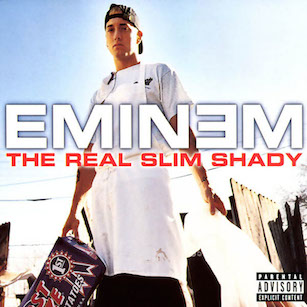
MARK BASS: I was on AOL in little rap chat rooms in each city we were going to. It lit some fire in Chicago that ended up being really beneficial to us later. KEMPF: One of my early steps was going to Chicago, getting it in the hands of people, including radio DJs. The EP is what we used to shop him around on a national level. ROSENBERG (DFP '03): I was in New York making good connections. It was almost like: This was so shocking, this guy wasn’t trying to shoot for the mainstream at all. SHEVY SHOVLIN, Motormouth Magazine: His imagery was intense. If you had something hot in Detroit, once it spread to New York, everybody was talking about it. MARK BASS: It was a little underground hip-hop subculture at that time. 5, 1998, with a cover designed by Tristan Eaton.ĮMINEM ("The Defiant Ones," 2017): I would just take different trips to anywhere I could, just trying to make any kind of name, just passing out cassettes. MARK BASS: I asked my brother-in-law to borrow $1,500, and he didn't think it was a good investment. "Slim Shady" felt very unique, very Marshall.ĮMINEM (FBT interview, 2002): Marky put his house up for a second mortgage to press the CDs and cassettes and vinyl, and just went full-throttle. "Infinite" had seemed very derivative of New York. But with the imagination and characters, he grew amazingly. So I don’t think there was a tremendous growth from "Infinite" to "Slim Shady" in terms of technicality. KEMPF: "Infinite" really showed off his mastery of the technical side of (rapping). I didn’t feel like I was honest with myself. The Basses had signed the rapper to their fledgling production company, FBT, and the EP was released in late 1997.ĮMINEM (DFP '99): Until I started bringing more of my personality, how I was in real life, I didn’t really feel whole. The eight-track "Slim Shady EP," funded by Mark Bass and Rosenberg, came together with the Bass Brothers at their 8 Mile Road studio, including work by Eminem friends DJ Head and Denaun Porter. He was being this crazy character with this great sense of humor. He started being himself, not trying to sound like anybody else, not rapping about what every rapper in New York did. (Eminem) sent me a cassette, the bare bones of what would become the "Slim Shady EP." I was blown away.
EMINEM SLIM SHADY EP CD FREE
PAUL ROSENBERG, Eminem's manager (Detroit Free Press interview, 2003): DJ Head called me one day (in 1997) and said, "You have to check out Eminem’s new stuff. Slang Ton, of the rap group Outsidaz, holds a cassette tape of the "Slim Shady EP" circa 1997. Why don't you try alternative? Blah blah blah." A lot of that s- was pissing me off, and I started releasing that anger in songs.

So Slim Shady, the alter ego, was created.ĮMINEM (DFP '99): (People were saying,) "You shouldn't rap. To a very small extent, he noticed the Insane Clown Posse and Esham thing (in Detroit) - how this negativity was selling out venues and record stores. KEMPF: He switched up a lot from the "Infinite" sound, which had been influenced by a lot of positive rappers - street but positive - like Nas and AZ. I had any excuse in the book thrown at me - from being white to I can't rhyme or I'm biting someone else's style. It's like crabs in a bucket, and everybody's trying to fight to get their way to the top and pulling the next one down. I was giving tapes out - like, "Here, take it." Nobody was trying to hear me when I was coming up. MARC KEMPF, former Eminem manager: He was starting to consider, "Should I just give this up and keep flipping burgers?" I pushed him not to, because I saw the talent.ĮMINEM (DFP '99): The lack of love (in Detroit) was bulls. I knew I could put words together, but I just didn’t have the whole formula yet. Now the 24-year-old was flipping the creative script: He hatched his new alter ego, as the mythology famously goes, while sitting on a toilet.ĮMINEM (Detroit Free Press interview, 1999): We tried to do some s- back in the day, but I was too young. Hometown producers Mark and Jeff Bass were firmly aboard, while then-manager Marc Kempf, who ran a Detroit rap magazine, was working to stir interest in the Midwest and beyond.Įminem’s obscure indie release "Infinite" in 1995 came and went. There was also Paul Rosenberg, a trusted ally from his early days and now a rookie attorney in New York.

In 1997, east-side resident Eminem - financially strapped and raising a toddler daughter - was sustained by just a handful of believers, including a crew of rapper friends from the city's small, ever-hustling, ever-struggling hip-hop circle.


 0 kommentar(er)
0 kommentar(er)
